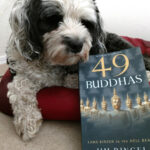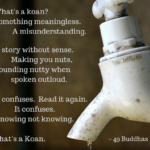Our president talks thoughtlessly, but that’s not what I mean by the Thoughtless Thought, nor is it what the Buddha means when he talks about emptiness.
I’m talking about a few weekends ago when I listened to Radio Lab’s story Emergence, which began by speaking about a river in Thailand where at night thousands of fire flies all blink in unison. Not a blink here and a blink there, but synchronized flashes, separate but on-cue, like little white Christmas lights, flashing alive as one in the darkness.
Then disappearing, so it’s dark again.
Then, flash. Brightness.
Then gone.
No one fire fly telling the others when to flash or when to extinguish, yet all acting together.
Empty of order, yet orderly.
In addition to fire flies, Radio Lab talked about ants. No one ant knowing him- or herself. None aware who he or she is, nor knowing anything about any other ant, neither. Even the queen. Who’s the queen? You’d think she’d be the bossy one, telling the other ants what to do. But she’s not. She’s the one who gave birth to all the other ants, but not orders.
The truth is—any given ant doesn’t know what they’re doing. Alone, they do nothing. Nothing independent. Sit down with an ant, psychoanalyze it, they can’t tell you why they exist. They haven’t a clue.
They’re incapable of thought. No ant ever stands up and says to the others, “Okay, come on, lets lift that stick, or carry that seed, or fight those other ants who don’t smell like us.” No ant ever says— “hey, listen up, fellows. Here’s what we ought to do…”
Ants only work as a colony. Boss-lessly.
A boss-less collection of dumb creatures collectively accomplishing the most sophisticated of tasks.
How do they do it?
Maybe we already know.
Because… our brains are a lot like ants. Just in the same way that no one ant orders the others, no one brain neuron originates any one thought. No one neuron dreams up a goal and coordinates the others by saying let’s go toward that.
Because thought is not a goal. Thought is a construction sprung from chaos. A collision of brainless brain neurons exploding in unison to create something whole. Like when we swing a flashlight around and around so its single beam creates a continuous circle of light.
Or better said… the illusion of a continuous circle of light.
That’s what our brains do. Create illusions we call thoughts, and then Ego. The random coming together of ants moving a twig. No one brain cell containing the thought “me”. No one neuron telling the others This is who we are. All neurons just flashing in unison, like fire flies, exploding as thoughts.
Exploding into a momentary haphazard confusion, which we then tame by labeling it “me”.
So, we can look back on it and say, did you see that chaos of exploding energy a moment ago. I did that. That was me.
Radio Lab didn’t mention this part. This part is something I wonder about.
I wonder about… is this what the Buddha means when he talks about emptiness?
You see… Buddhism takes no stand on God, whether there is one or not, or whether there are many gods and not just one. It doesn’t really care.
But Buddhism is clear about this. There is no 3rd party Creator of us or anything in the universe.
Buddhism says that each and every moment is just the universe realizing itself anew. A crackle in time that randomly transforms into inconsequential consciousness. A quick trip, here and gone. Like fire fly lights on a Thai river. As false about its existence as it is true. Here, and then gone.
No moment of life can be held onto. Because holding on will not sustain it. It only leaves us yearning for the good old days gone by. Time passed without realization.
The moment we are living at the beginning of this sentence no longer exists by the time the sentence ends. Only its memory, which we hold onto and mistake as “me”. So that this mis-perception of “me” may persist and gnaw at us for recognition.
When we meditate, we enter a stillness in which thoughts explode. Novice meditators say Oh, no, I am having a thought. That’s not good for my meditation.
But thoughts are as natural as the exploding neurons that create them.
Meditation is a process of seeing thoughts. Watching them awaken and blossom, and then seeing them die. No one thought “me”. Simply an illusion I cling to as “me”, which has already disappeared from existence.
And I wonder… is this what the Buddha means when he talks about emptiness?






